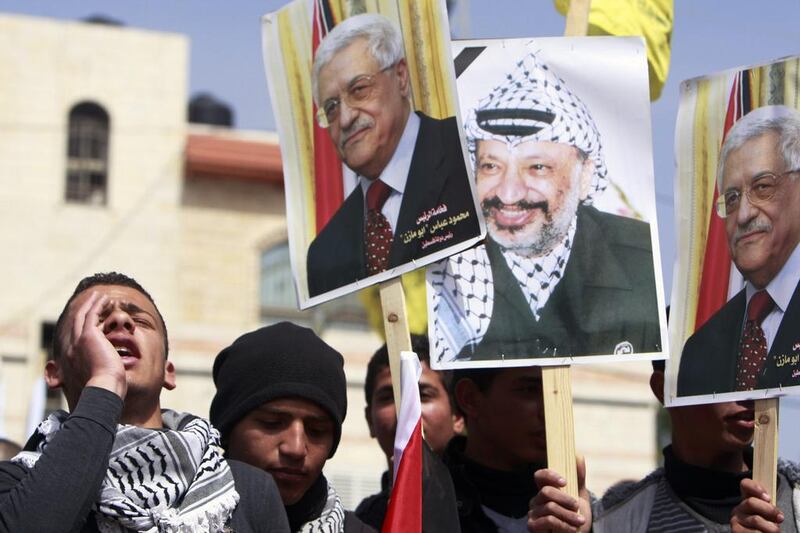NEW YORK // Barack Obama will press the visiting Palestinian Authority president Mahmoud Abbas on Monday to accept a new negotiating framework that will allow the faltering peace talks with Israel to continue beyond next month’s deadline.
Odds for the talks to continue appear slim. But a shifting regional background is one possible game changer.
“When you see the Saudis and Emiratis getting so tough on the Muslim Brotherhood, and on Qatar for supporting them, by extension this includes Hamas,” said David Pollock, senior fellow at the Washington Institute for Near East Policy.
Hamas is an ideological affiliate of the Brotherhood.
“That suggests [Saudi Arabia and the UAE] have an interest in actively influencing the Palestinian arena now,” Mr Pollock said.
When Mr Obama visits Saudi King Abdullah in Riyadh later this month the talks will likely focus on the nuclear negotiations between Iran and world powers. But it is possible the US president will also push for greater Gulf help with the Palestinian-Israeli peace process.
The US secretary of state John Kerry consulted King Abdullah on the peace talks during an unscheduled visit to Saudi Arabia on a trip to the region in January.
Still, Mr Abbas faces an Israeli government unwilling to offer concessions and a US administration focused on other regional priorities and unwilling to exert pressure on its close ally.
Mr Kerry has ferried between Washington and the region at least 10 times since July, when peace talks began after a three-year hiatus.
Yet there is little evidence that the two sides are any closer than when the process began.
“The level of mistrust is as large as any level of mistrust I’ve ever seen, on both sides,” Mr Kerry told Congress last week. “Neither believes the other is really serious.”
The details of the new framework have yet to be made public, but US officials have said they fear that if the deadline nears with no agreement, Israel will not release a final contingent of Palestinian prisoners scheduled to be freed on March 28, and the talks will crumble for good.
Mr Obama is expected to push Mr Abbas, much as he did when he met the Israeli prime minister, Benjamin Netanyahu, in Washington earlier this month, to ratify a framework that would prolong talks until the end of the year, a senior US official said.
Mr Obama told Mr Netanyahu that both leaders must make “tough decisions”.
Palestinians and Israelis have held negotiations mediated by Washington over the past 20 years that aimed to create a viable and sovereign Palestinian state.
But the unresolved issues that have doomed each round of talks have not changed.
“One definition of madness is to keep on doing the same things and expecting a different outcome, but that seems to be what is happening now,” said Marina Ottaway, a senior scholar with the Washington-based Wilson Center’s Middle East programme.
“And I don’t see any indication that this is a brilliantly different framework that contains ideas that have never been explored before,” she said.
Palestinian officials have said that the draft framework offers even less than what was on the table during talks in 2000.
One of the points that has angered Palestinians, and which was not part of the earlier rounds of talks, is Mr Netanyahu’s demand that they recognise Israel as a Jewish state, which he would consider a sign of seriousness and good faith.
But Mr Abbas has said the demand is unacceptable as it would mean renouncing the right of return for the estimated five million Palestinian refugees and their descendants scattered across the region and world.
“There is no Palestinian politician who really believes large number of Palestinians are ever going to go back to Israel,” Ms Ottaway said. “But it’s very different to say that than to say we are giving up the concept before the negotiations are even finished without getting anything in return.”
Even Mr Kerry expressed frustration with Mr Netanyahu’s position on Thursday, saying it was a “mistake” to continue raising the issue “as the critical decider”. But even as the two sides are unwilling to change their positions, Mr Abbas is under great pressure from western leaders to extend the talks.
If a framework is agreed upon, it will likely be “downgraded to the point where neither side has to accept everything that’s in it”, Mr Pollock said. “They can accept it with reservations, have a framework by the deadline and keep talking. It’s a way out.”
Mr Abbas’s Palestine Liberation Organisation, however, issued a statement last week voicing its “absolute rejection” of any extension.
Former senior negotiator and PLO board member Hanan Ashrawi said that without a freeze on Jewish settlement construction in the West Bank, further discussions would be pointless.
“By extending talks even one more year, they will finish the Greater Israel project given the alarming escalation of settlement activity,” she said. “If the document is what we have seen [up until now] then it is not even a starting point.”
tkhan@thenational.ae
* With reporting by Reuters





